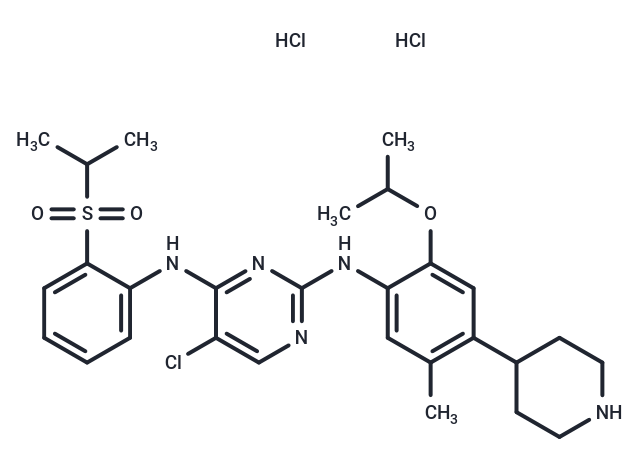Shopping Cart
- Remove All
 Your shopping cart is currently empty
Your shopping cart is currently empty

Ceritinib dihydrochloride (LDK378 dihydrochloride) is a selective, orally bioavailable, ATP-competitive inhibitor of ALK tyrosine kinase (IC50 of 200 pM) and also inhibits IGF-1R, InsR, and STK22D [IC50 values of 8, 7, and 23 nM, respectively], demonstrating significant antitumor potency.

| Pack Size | Price | Availability | Quantity |
|---|---|---|---|
| 5 mg | $43 | In Stock | |
| 10 mg | $58 | In Stock | |
| 25 mg | $71 | In Stock | |
| 50 mg | $85 | In Stock | |
| 100 mg | $126 | In Stock | |
| 1 mL x 10 mM (in DMSO) | $60 | In Stock |
| Description | Ceritinib dihydrochloride (LDK378 dihydrochloride) is a selective, orally bioavailable, ATP-competitive inhibitor of ALK tyrosine kinase (IC50 of 200 pM) and also inhibits IGF-1R, InsR, and STK22D [IC50 values of 8, 7, and 23 nM, respectively], demonstrating significant antitumor potency. |
| Targets&IC50 | INSR:7 nM , STK22D:23 nM, IGF-1R:8 nM , ALK:0.2 nM |
| In vitro | In vitro experiments also showed that lipopolysaccharide (LPS)-induced migration of MDSCs was similarly owing to the activation of GRK2 and upregulation of CCR2 by LPS, whereas the treatment with LDK378 partially blocked the LPS-induced phosphorylation of p38 and GRK2 and decreased the expression of CCR2 on the cell surface, therefore leading to the suppression of MDSC migration[1]. |
| In vivo | Ceritinib significantly improved the survival of CLP-induced polymicrobial septic mice, which was paralleled by reduced organ injury, decreased release of inflammatory cytokines and decreased recruitment of MDSCs to the spleen.Importantly, Ceritinib inhibited the migration of MDSCs to the spleen by blocking the CLP-mediated upregulation of CC chemokine receptor 2 (CCR2), a chemokine receptor critical for the recruitment of MDSCs.Mechanistically, Ceritinib treatment blocked the CLP-induced CCR2 upregulation of MDSCs via partially inhibiting the phosphorylation of p38 and G-protein-coupled receptor kinase-2 (GRK2) in bone marrow MDSCs of septic mice[1]. |
| Alias | LDK378 dihydrochloride |
| Molecular Weight | 631.06 |
| Formula | C28H38Cl3N5O3S |
| Cas No. | 1380575-43-8 |
| Smiles | Cl.Cl.CC(C)Oc1cc(C2CCNCC2)c(C)cc1Nc1ncc(Cl)c(Nc2ccccc2S(=O)(=O)C(C)C)n1 |
| Relative Density. | no data available |
| Storage | store at low temperature,store under nitrogen | Powder: -20°C for 3 years | In solvent: -80°C for 1 year | Shipping with blue ice. | ||||||||||||||||||||||||||||||||||||||||
| Solubility Information | H2O: 5 mg/mL (7.92 mM), Sonication is recommended. DMSO: 95 mg/mL (150.54 mM), Sonication is recommended. | ||||||||||||||||||||||||||||||||||||||||
Solution Preparation Table | |||||||||||||||||||||||||||||||||||||||||
H2O/DMSO
DMSO
| |||||||||||||||||||||||||||||||||||||||||

Copyright © 2015-2025 TargetMol Chemicals Inc. All Rights Reserved.